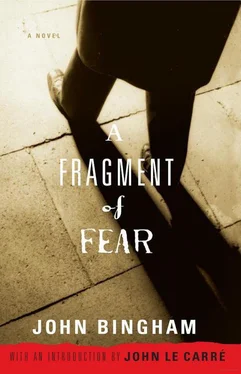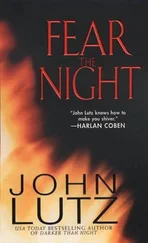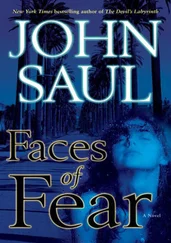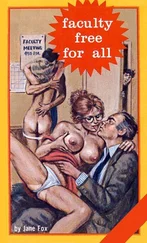John Bingham - A Fragment of Fear
Здесь есть возможность читать онлайн «John Bingham - A Fragment of Fear» весь текст электронной книги совершенно бесплатно (целиком полную версию без сокращений). В некоторых случаях можно слушать аудио, скачать через торрент в формате fb2 и присутствует краткое содержание. Жанр: Триллер, на английском языке. Описание произведения, (предисловие) а так же отзывы посетителей доступны на портале библиотеки ЛибКат.
- Название:A Fragment of Fear
- Автор:
- Жанр:
- Год:неизвестен
- ISBN:нет данных
- Рейтинг книги:3 / 5. Голосов: 1
-
Избранное:Добавить в избранное
- Отзывы:
-
Ваша оценка:
- 60
- 1
- 2
- 3
- 4
- 5
A Fragment of Fear: краткое содержание, описание и аннотация
Предлагаем к чтению аннотацию, описание, краткое содержание или предисловие (зависит от того, что написал сам автор книги «A Fragment of Fear»). Если вы не нашли необходимую информацию о книге — напишите в комментариях, мы постараемся отыскать её.
A Fragment of Fear — читать онлайн бесплатно полную книгу (весь текст) целиком
Ниже представлен текст книги, разбитый по страницам. Система сохранения места последней прочитанной страницы, позволяет с удобством читать онлайн бесплатно книгу «A Fragment of Fear», без необходимости каждый раз заново искать на чём Вы остановились. Поставьте закладку, и сможете в любой момент перейти на страницу, на которой закончили чтение.
Интервал:
Закладка:
So in the late afternoon I bought a bunch of red and white carnations, hired a taxi, and drove to the cemetery. The cemetery keeper, with suitable words of dismay at the cause of her death, showed me her grave. I laid the carnations on the grave without a card, because in the circumstances I couldn’t think of anything suitable to write.
There was one other wreath on the bare soil, a rather sumptuous affair made up mostly of gladioli, the flowers now sad and faded in the sun. I bent over to read the inscription on the card, sorry that I had done Bardoni an injustice, and found I hadn’t.
The card simply said: From the Stepping Stones in memory of happier times. Some small type in the bottom left-hand corner read: Trans-Continental Flowers Ltd.
I had heard of some shaggy-looking singers called the Rolling Stones, but the Stepping Stones meant nothing to me.
Still, it meant that somebody, probably in England, had had the thought to wire some flowers for the funeral. It also meant that somebody, probably in England, knew when the burial was to take place, though the significance of this was not and could not be apparent to me at the time.
What with the carnations, the taxi, and a tip to the cemetery-keeper, the expedition had cost me rather over two pounds.
I sometimes think it was the worst spent money I have ever laid out.
CHAPTER 2
Juliet and I were due to be married on October 16th, and it might seem odd that we were separated. The reasons are simple enough. I was in Italy because I had had a bit of a battering in a car accident. There was no permanent damage, but a couple of weeks in hospital while the bits and pieces mended had left me pale and under the weather. I was not sleeping very well for one thing. So the doctor had recommended sun, swimming, and all the rest of those things which trip so easily off the medical tongue.
Juliet, on the other hand, had to go to America as a secretary attached to a government delegation and attend conferences. So we separated for a month, with moans and sighs, and all the appropriate agony.
As a result of conference delays she was not now able to return before October 11th, which would mean a hectic few days before the wedding. I stayed in Italy till October 2nd.
During the last few days I developed my “thing” about old Mrs. Dawson. I was writing up the odd descriptive paragraph based on my notes, and kidding myself that I was doing some work. But of course I wasn’t. Not really. I was swimming and sunbathing, and strolling along the little roads, peering in at cottages among the vines and lemon trees, and reading, and breakfasting late in my pyjamas on the balcony overlooking the sea. I hadn’t a care in the world, but plenty of time to think.
Everybody knows that when everything is going well, and there is not a cloud in the sky, then that is the time to watch out, because such conditions are not normal in this troubled life, and can’t last. One pays lip service to such platitudes, but that is about all. As far as Juliet and I were concerned, we were both healthy, in love, and solvent, and I had no morbid premonitions.
I had no firm plot for my next book, but I knew that would come. I was not worried. My mind was, in a way, a sort of vacuum, and into the vacuum seeped this “thing” about Lucy Dawson.
What kept worrying me, as I am sure it did the Italian police, was the fact that she had not been robbed. Every explanation I invented could easily be faulted.
The man had planned to rob her, but suddenly thought he was about to be disturbed and had left hurriedly. (But he could have returned.) Or he had had an inhibition about robbing a dead body, thinking it might bring ill luck. (Then why kill her? Murder is not for sensitive souls.) So it went on.
Meanwhile her room remained locked on the instructions of the Italian police, and pending action by the British Consulate to remove her belongings; which I expect annoyed Bardoni because he couldn’t let it.
Two days before I left the hotel to fly back to London I had what I then thought, in my ignorance, was a stroke of luck. I wandered back from a mid-morning swim in my towelling wrap. It was somewhere about eleven o’clock, and I thought I would change and do an hour or so’s work before the pre-lunch drink.
I trudged up from the sandy beach and through the hotel vestibule, my leather bathing shoes slapping on the gleaming tiled floor, then up the uncarpeted wooden staircase to the first floor, and along the corridor to my room.
On the way, I had to pass Mrs. Dawson’s room. I remember I was thinking about the malarial conditions which had finally caused the Greek settlements to abandon the temples at Paestum when I noted that her door was ajar.
I paused and listened.
There was no movement inside the room. I heard faint voices from below in the hotel, and from outside the cries of swimmers and people playing tennis, but they seemed filtered, like echoes from far away.
I gently pushed the door open.
In the sunlight which percolated through the half-opened jalousies I saw a bucket and a mop near the doorway, and guessed that the hotel management had decided, police or no police, Consulate or no Consulate, that the room should be cleaned. Sophia would be doing the cleaning. She cleaned my room, and all the others along the corridor, a plump, cheerful little dark-skinned woman of about thirty-five. Either she had left earlier than usual to have her mid-day meal, or she had forgotten some cleaning material, or had gone to fetch some more.
I guessed I could handle Sophia, yet when I went in I trod as softly as my beach shoes would allow-perhaps because I had a slightly guilty conscience, knowing I should not be there; perhaps because of the associations of the room with the dead woman; perhaps a bit of both.
Two vases of flowers were on the built-in dressing-table. The roses were dead, but the gladioli still had some red at their tips which had not yet quite faded.
Two monogrammed Edwardian silver hairbrushes were set neatly beside the vases and two silver boxes with intricately worked edges, a glass powder bowl with a silver top and two ebony clothes brushes with silver initials. On the washbasin shelf were one or two medicine bottles, a bottle of aspirins and a small pill box.
At the back of the door her beige-coloured tweed travelling coat was hanging. Over it hung one of her pastel-coloured chiffon scarves.
Still laid out on the bed was her silk night-dress-old-fashioned, with inset lace and hand embroidery. Yet although it looked well worn the silk was still thick and strong.
Outside, in the tiny anteroom, the wardrobe was full of her clothes; unexceptionable print dresses, blouses, and cotton skirts. Four or five pairs of sandals and neat walking shoes were placed in a row on the floor of the cupboard.
I went into the tiled bathroom and noted her mauve silk dressing-gown, her toothbrush in its place, and a large tablet of bathsoap in the soap dish. I picked it up. Like her clothes the soap was unexceptionable. I think it was jasmine.
I walked back into the bedroom and opened the dressing-table drawer. Face cream, lip-salve, a nail-case in mauve leather, some corn plasters, a pair of curling tongs, hairgrips and hairpins. Handkerchiefs in an embroidered sachet. On the night table there were three books-a biography of Edward VII, two Tauchnitz editions of modern novels, two maps and a guide to Naples.
As I looked round the room, a slight wind moved the thick, blue woven curtains. The dust on the tiled floor and the faded flowers on the dressing-table spoke of neglect and loss, but the voices from the beach still filtered from another life, and through the windows I could see the waiters moving about behind the cactus hedge, under the pine trees, setting the tables for lunch. Their white coats made patches of light against the bright reds, the yellows, the greens and blues of the fringed tablecloths.
Читать дальшеИнтервал:
Закладка:
Похожие книги на «A Fragment of Fear»
Представляем Вашему вниманию похожие книги на «A Fragment of Fear» списком для выбора. Мы отобрали схожую по названию и смыслу литературу в надежде предоставить читателям больше вариантов отыскать новые, интересные, ещё непрочитанные произведения.
Обсуждение, отзывы о книге «A Fragment of Fear» и просто собственные мнения читателей. Оставьте ваши комментарии, напишите, что Вы думаете о произведении, его смысле или главных героях. Укажите что конкретно понравилось, а что нет, и почему Вы так считаете.












